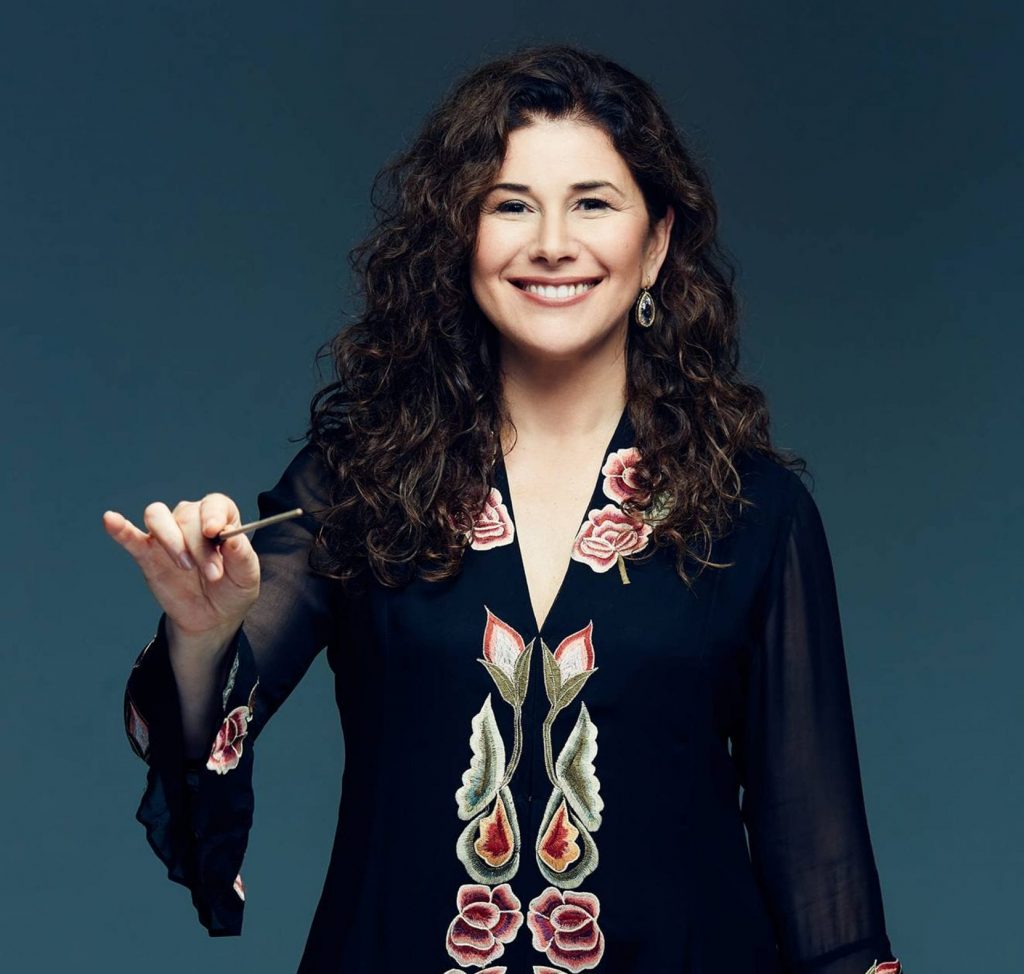Russian choral “Icons” shine with Seraphic Fire, Sharkova

The sound of bells is so embedded in Russian culture that composers of sacred music there often used human voices to depict bells ringing — a technique that, in Soviet times, encoded references to religious faith when such expressions were officially banned.
So said Elena Sharkova, a Russian native now based in California, and the illuminating guest conductor for one of the most unique programs that Miami choral ensemble Seraphic Fire has ever assembled: Icons: Russian Choral Masterworks.
On Wednesday night in the imposing sanctuary of Beth David Congregation in Miami, in the first of five performances, Sharkova conduced fifteen singers with simple, purposeful and effective gestures. She matched female altos with deep, low male bass timbres — on which Russian choral music heavily relies — to produce a singular corporate sonority.
Seraphic Fire delivered rousing proclamations that thundered through the temple, but their soft singing on Wednesday was particularly exquisite. Blended vocal timbres were silvery, the high-voiced sopranos and tenors adding an otherworldly aura to the sonic setting.
The concert opened with seven movements from Rachmaninoff’s All Night Vigil, one of the greatest sacred works of Russian choral literature, its spare textures and reverential score far removed from the lush romanticism of Rachmaninoff’s instrumental music.
The choir’s flawless intonation and musical precision turned “Come, Let Us Worship” into a stirring paean of faith. The serenity of “Blessed is the Man” came closest to the free-flowing melodic lines so typical of Rachmaninoff. Sharkova’s fine detailing of dynamic contrast and the sheer beauty of the singing seemed to suspend time for an instant.
Steven Soph’s subtly textured lyric tenor rose over the silvery vocal mass in “ Now Lettest Thou Thy Servant Depart.” The repeated Alleluia of “Praise the Name of the Lord” moved in strongly Russian, folk-inflected strokes. Full voiced, triumphant exultation turned “To Thee, the Victorious Leader” into an anthem of devotional fervor.
Sharkova told the audience that Rachmaninoff wrote the music for choruses of one hundred. Those numbers aren’t necessary when you have Seraphic Fire; indeed, the group sounded like more than twice its number.
Although little known in the West, Grigory Sviridov (1914-1998) was one of Russia’s most renowned choral composers. Sharkova noted that his Inexpressible Wonder, a series of religious pieces, was composed over a thirty year period in secret due to Soviet restrictions. Publicly, he was honored by the government for his patriotic cantatas and settings of Russian poets. Five sections from the collection revealed Sviridov’s widely varied creative palette that ranges from traditional Russian Orthodox chant to the tonal ambiguity of late Shostakovich.
Enrico Lagasca’s mellow solo bass set the atmosphere for the hymn-like stasis of “Hear Us O Lord” and “It is Worth.” The warmly melodic “Christmas Song” was almost a New Age choral vignette that could become a pop hit. “Glory and Alleluia” combine the soulful sounds of Mother Russia with contemporary harmonic shifts. Sara Guttenberg’s ravishing mezzo stood out in a lengthy solo of somber beauty. Steven Eddy and Lagasca added depth at the low end. The mesmerizing tones of Sviridov’s “Having Witnessed a Wondrous Birth” vividly defined the composer’s distinctively individual voice, free of musical ideology or trendiness.
The Chimes: A Miracle Play by Valery Gavrilin (1939-1999) was part of the incidental music for The Execution of Stepan Razin, a play about a 17th Century Cossack who led a rebellion against tsarist rule.
“Death of the Robber – Morning Bells” encompassed an indigenous,Volga Boatman-type of melody. The strength and purity of Patrick Muehleise’s tenor rang out as the protagonist awaiting death. Eric Alatorre’s dark basso profundo encompassed the narrator’s commentary. There was darting lightness and a sense of fun in the wordless “Nonsense,” almost like a children’s nursery rhyme. Sarah Moyer’s high soprano and spot-on trills were a delight in “Evening Music.” Sharkova said the score could not be Russian without ending in tragedy, and so the plaintive “White Snow” unleashed a cascade of a capella power and the sound of tears.
Two Russian folk songs concluded the program on a lighter note. Seven male voices were astutely balanced for “Legend of The Twelve Robbers.” Cameron Beauchamp’s monk-like bass tone contrasted with the darkness of Alatorre’s wonderful gravelly compass. The tantalizing tune of “Evening Bells” featured tenor Paul John Rudoi singing with the ease and style of a folk-pop artist. Sharkova drew winning textures from the superb singers.
Seraphic Fire repeats the program 7 p.m. Thursday at Vanderbilt Presbyterian Church in Naples, 7:30 p.m. Friday at First United Methodist Church in Coral Gables, 7:30 p.m. Saturday at All Saints Episcopal Church in Fort Lauderdale, and 4 p.m. at All Souls Episcopal Church in Miami Beach. seraphicfire.org
Posted in Performances
Leave a Comment
Thu Jan 16, 2020
at 1:48 pm
No Comments




